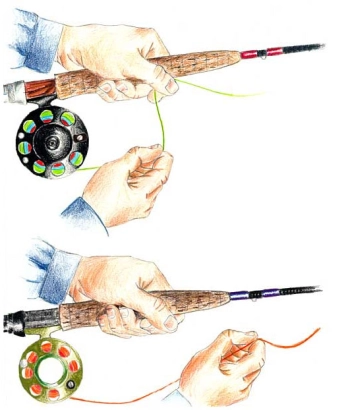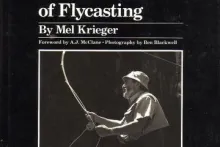Three ways of improving your fly line control. Line control is much more than mending
Illustrations by Benjamin Waedeled.
If someone says line control to the majority of fly fisherman the very first thing they think of is mending their line to get a perfect drift.
We spend a great deal of time and effort in search of a drag free drift. What good does that drift do if poor line control keeps us from setting the hook or landing a fish? I see more fish lost because of a line control problem than because of a "break off".
Here are some common line control problems and their solutions.
First way of improving your fly line control
Avoid the stray hand
Failing to bring the line from the line hand to the rod hand.
Lack of control occurs when the line hand does not bring the line over to the rod hand at the end of the cast. We end with the line hand up to two feet away from the rod. When a fish strikes all that extra slack line has to be "moved" before you establish contact with the fish and set the hook. How can you correct this problem? Simple. At the completion of the cast remember to bring the line over to the rod hand as the fly is landing on the water and tuck the line between the index finger and the thumb of your rod hand.
Second way of improving your fly line control
Avoid the high hook set
Setting the hook by raising the rod straight up.
Too many of us set the hook by raising the rod straight up.
Not just a little, the full length of the our arms. When we do this we have used all our line control options in one movement.
Our only hope is to immediately grow a foot taller or jump straight up. Correct this problem by concentrating on setting the hook with a slight upward movement of the rod at a 45 degree angle to the water's surface.
Third way of improving your fly line control
Avoid the line loop
Not keeping up with the current.
We are obsessed with preventing drag.
This obsession all to often works against us. I see more people who either don't strip in any line as their fly floats back toward them or, at best, strip it in too slowly. When asked "why", the typical response is "I don't want to pull my fly."
The result is a loop of line below their rod tip and they can't make contact with a fish before it is to late. Don't worry about stripping to fast. Strip in your line with short strokes so you can adjustments for current changes during the drift.
- Log in to post comments











That really helps
That really helps, all three of these tips will make a major difference in how you handle the stream or how the stream will handle you. Thank you for all that you have done to get me ready for the stream and catching fish.